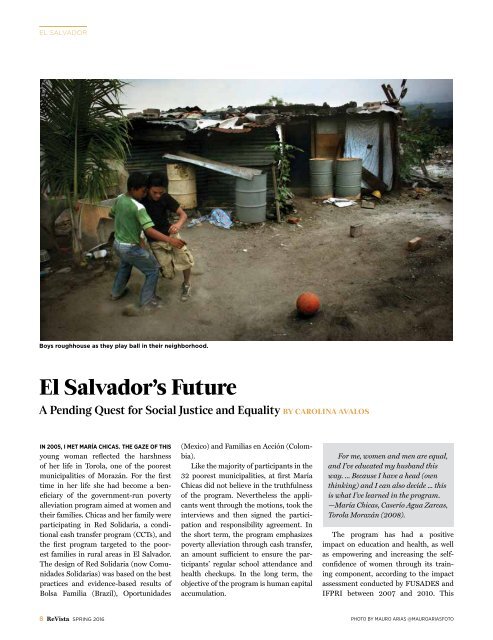EL SALVADOR
8clowSgZh
8clowSgZh
Create successful ePaper yourself
Turn your PDF publications into a flip-book with our unique Google optimized e-Paper software.
<strong>EL</strong> <strong>SALVADOR</strong><br />
Boys roughhouse as they play ball in their neighborhood.<br />
El Salvador’s Future<br />
A Pending Quest for Social Justice and Equality BY CAROLINA AVALOS<br />
IN 2005, I MET MARÍA CHICAS. THE GAZE OF THIS<br />
young woman reflected the harshness<br />
of her life in Torola, one of the poorest<br />
municipalities of Morazán. For the first<br />
time in her life she had become a beneficiary<br />
of the government-run poverty<br />
alleviation program aimed at women and<br />
their families. Chicas and her family were<br />
participating in Red Solidaria, a conditional<br />
cash transfer program (CCTs), and<br />
the first program targeted to the poorest<br />
families in rural areas in El Salvador.<br />
The design of Red Solidaria (now Comunidades<br />
Solidarias) was based on the best<br />
practices and evidence-based results of<br />
Bolsa Familia (Brazil), Oportunidades<br />
(Mexico) and Familias en Acción (Colombia).<br />
Like the majority of participants in the<br />
32 poorest municipalities, at first María<br />
Chicas did not believe in the truthfulness<br />
of the program. Nevertheless the applicants<br />
went through the motions, took the<br />
interviews and then signed the participation<br />
and responsibility agreement. In<br />
the short term, the program emphasizes<br />
poverty alleviation through cash transfer,<br />
an amount sufficient to ensure the participants’<br />
regular school attendance and<br />
health checkups. In the long term, the<br />
objective of the program is human capital<br />
accumulation.<br />
For me, women and men are equal,<br />
and I’ve educated my husband this<br />
way. ... Because I have a head (own<br />
thinking) and I can also decide ... this<br />
is what I’ve learned in the program.<br />
—María Chicas, Caserío Agua Zarcas,<br />
Torola Morazán (2008).<br />
The program has had a positive<br />
impact on education and health, as well<br />
as empowering and increasing the selfconfidence<br />
of women through its training<br />
component, according to the impact<br />
assessment conducted by FUSADES and<br />
IFPRI between 2007 and 2010. This<br />
8 ReVista SPRING 2016 PHOTO BY MAURO ARIAS @MAUROARIASFOTO


